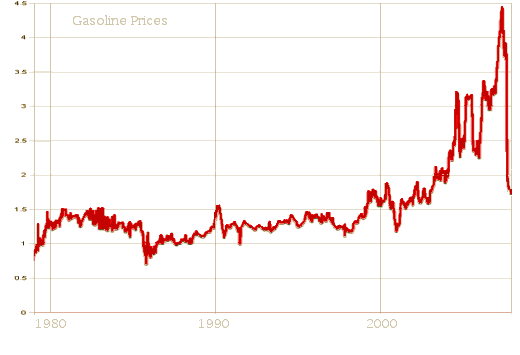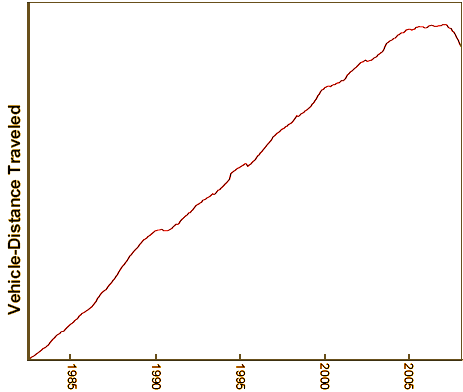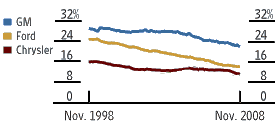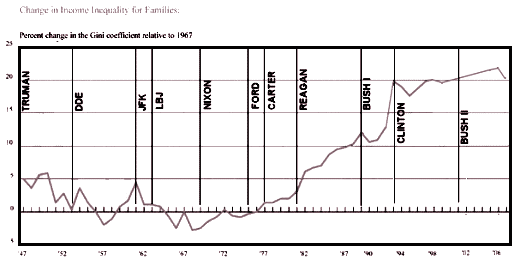

Friday, Dec. 12, 2008
Decline In American Driving Reaches Year-MarkDrop of Nearly 100 Billion Miles Driven Heightens Need for Highway Finance Reform
Americans drove more than 100 billion fewer miles between November 2007 and October 2008 than the same period a year earlier, said U.S. Transportation Secretary Mary E. Peters, making it the largest continuous decline in American driving in history."
"As driving decreases and vehicle fuel efficiency continues to improve, the long term viability of the Highway Trust Fund grows weaker. The fact that the trend persists even as gas prices are dropping confirms that America’s travel habits are fundamentally changing. The way we finance America’s transportation network must also change to address this new reality, because banking on the gas tax is no longer a sustainable option," said Secretary Peters.The Secretary noted that Americans drove 3.5 percent less, or 8.9 billion fewer vehicle miles traveled (VMT), in October 2008 than October 2007, making it the sharpest decline of any October since 1971…
The Highway Trust Fund, the federal government’s primary source for financing highway, bridge and transit projects, took in substantially less in Fiscal Year 2008 than in the previous year. As a result of the continued decline in VMT and the use of more fuel efficient cars, the Highway Trust Fund, which is primarily funded through federal gas tax receipts, collected $31 billion in revenue between October 2007 and September 2008 – $3 billion less than it collected in Fiscal Year 2007, while federal transportation spending increased by $2 billion. "This underscores the need to change our policy so American infrastructure is less dependent on the amount of gas American drivers consume," said Federal Highway Administrator Tom Madison.
 Oh yeah, there’s another consequence, the American Automobile Industry is about to become extinct.The last ten years for our auto industry has been shaky, and recently worse than shaky, more like a disaster in the making. People don’t want to buy large cars that use a lot of gasoline anymore, and that’s what our automobile makers make. So they’ve gone from bad to worse for a while, but with Americans driving less and worried about gas prices or the environment, they’ve posted their worst sales ever – particularly with the financial crisis these last few months. The Law of Inadvertent Consequences strikes again.
Oh yeah, there’s another consequence, the American Automobile Industry is about to become extinct.The last ten years for our auto industry has been shaky, and recently worse than shaky, more like a disaster in the making. People don’t want to buy large cars that use a lot of gasoline anymore, and that’s what our automobile makers make. So they’ve gone from bad to worse for a while, but with Americans driving less and worried about gas prices or the environment, they’ve posted their worst sales ever – particularly with the financial crisis these last few months. The Law of Inadvertent Consequences strikes again.
All of these things have been hanging around waiting to happen for a pretty long time [with nobody reallt looking]. And that gasoline graph at the top of the page? Was it due to dwindling oil reserves on Planet Earth, the Arabian Sheiks playing a supply/demand game, or the American Oil Companies posting record profits? All of those things had something to do with it, of course. But the truth is that it was our belief that it was due to those other things that sustained the huge rise in gasoline prices. The fundamental problem was an "oil bubble." When oil prices started rising, speculators on the oil futures commodity market began to trade heavily, and as prices rose an economic "bubble" formed. A "bubble" is a self sustaining situation when Capitalism gets out of hand – and the "Gold Rush" was on! Since the Deregulation in 1980, we’ve had three overlapping bubbles [Tech Stocks, Housing, Oil], now they’ve all burst.
Now we’re left with a tanking Stock Market, failing Investment Institutions, haunted with the consequences of the Technology bubble, the Housing bubble, and the Oil bubble. Our infrastructure budget is dwindling and our automobile industry is in the toilet. So, driving less and wanting fuel efficient cars are good things in the long run, and maybe they’ll help our global warming problem, but for the moment, we’re in pretty deep trouble. The speculators on the various Commodity Markets have really put us in some hot water, and they are gearing up to keep us from doing the right thing – regulating those Markets with a vengeance. Look for the fight to be vicious in the coming months. The people who play with these markets and frolic in the Casino of Derivatives that lies within them are going to want to keep their playground monitor-free. And all that "bubble" money we paid extra for tech stocks and houses and gasoline went somewhere. A lot of it went into their pockets.
|
in·vec·tive Än-vÄ›k’tÄv
noun
|
but I never knew why that had held on so long [he died over 60 years ago]. It’s because the New Deal shut down the joys of Casino Capitalism and the get-filthy-rich-business-world. No more J. D. Rockefellers or J.P. Morgans. No more Biltmores or Newport Mansions. Just rich, not filthy rich. The restraints of the New Deal didn’t loosen until the 1980’s, and only came unglued at the turn of the New Century. So, what we need to do is going to slam Wall Street just like the New Deal did – speculators and good guys alike. The most important graph of all these endless graphs I keep posting [that put you to sleep] is this one:

It’s the GINI Coefficient. It measures the concentration of wealth. Its derivation is complex but the idea is easy to understand. It compares the distribution of wealth in a population to an expected norm. What it shows is that beginning with Reagan there has been a dramatic and sustained concentration of wealth in America. Here’s another version [from Wikipedia] that has estimates for the years before 1967 when it started being reported officially [the far right column contains values converted to be comparable with those in the graph above]:
| 1929: | 45.0 | (estimated) | 16.58% |
| 1947: | 37.6 | (estimated) | -2.59% |
| 1967: | 39.7 | (first year reported) | 2.85% |
| 1968: | 38.6 | (lowest index reported) | 0% |
| 1970: | 39.4 | 2.07% | |
| 1980: | 40.3 | 4.40% | |
| 1990: | 42.8 | 10.88% | |
| 2000: | 46.2 | 19.69% | |
| 2005: | 46.9 | 21.50% | |
| 2006: | 47.0 | (highest index reported) | 21.76% |
| 2007: | 46.3 | 19.95% |
The last time we had a GINI Coefficient like we have now was 1929. America can’t sustain the system that allows this kind of concentration of wealth without ending up in a Depression. Ronald Reagan opened the door that allowed the concentration of wealth in 1980, and Senator Phil Gramm put a superhighway through it in 2000. The people who have been in the business of wealth concentration are powerful, and part of what we need to head off a disastrous deflationary spiral involves closing their superhighway. They’re going to continue to yell bloody murder [and there are still plenty of listening ears in Washington].
Like the problem with the Highway Trust Fund, based on tax revenues, here’s a close-to-home instance of a similar consequence:
During the past couple of years, we here in the metro Atlanta area have been under severe restrictions on the outdoor use of water, as well as good-citizen type encouragement to conserve indoor use (turn off the water while brushing your teeth instead of letting it run; collect the water that runs to heat up the shower and use it to water your plants).
The consequences: we used about 20% less water than a year ago. So now the rate is going to have to go up in order to be able to make the payments on bonds that depend on water fees.
It’s understandable as an obligation that must be paid — but it sort of puts a damper on our feeling virtuous for conserving, like good little green citizens.
A friends son who worked for Bears Stearns was always coming to me and making comments about how great Reagan and Bush are and for that matter the Republicans. I never said I was a Democrat or anything about politics but his parents must have said something about me. He would have his glass of wine in hand and cheerfully tell me what a great job Bush and Cheney were doing. I stopped coming over to his parents house to see their grandkids when he made a comment to his Mother in front of his 4 little kids about his Mom should adopt a Mexican so that the Mexican child could take care of cutting their grass. I sat there wanting to scream at him and say you are not funny and you say things like this in front of your children which makes it even worse but I didn’t. After Bear Stearns had a problem he went to a fancier Wall St firm and he was given even more $. The firm reported a big loss yesterday . His Mom told me when the firm hired him he called her and told her that she and his Dad could have retired on what he got for signing the dotted line to work for his present employer. It made me want to get sick to my stomach. I want to know why people like my friends son don’t feel any moral problems about getting richer while the average family just keeps getting poorer.
Thanks for that excellent Gini graph.
A group of us came at America’s current concentration of wealth from a slightly different direction for some graphs we did for the June 30, 2008 special “New Inequality” edition of The Nation magazine.
We looked at the average income of the top 0.01 percent as a multiple of the average income of the bottom 90 percent over the last century. We ended up with a trend line that tracks your Gini line almost to the T.